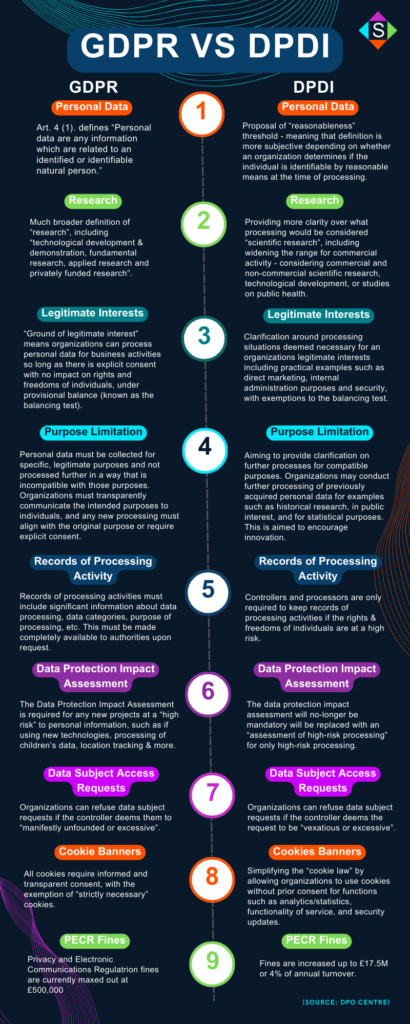Navigating the DPDI: A Bridge or a Rift in Data Regulation?
In the ever-evolving landscape of data protection, legislative frameworks are changing rapidly to address the concerns around individual rights and responsibilities of organizations. Governing bodies around the world are crafting data regulation frameworks to protect the needs of their own citizens. While data localization laws vary from country to country, it is common for frameworks to take inspiration from one another.
Recently the UK government produced The Data Protection and Digital Information Bill (DPDI), poised to replace the gold standard of the European Union’s General Data Protection Regulation (GDPR). This article dives into the creation of the DPDI, its objectives, and potential impact, and compares it to the GDPR.
How did the DPDI come to be?
Born out of the post-Brexit locale, the DPDI is the embodiment of the UK’s aspiration to carve an independent path in data governance autonomous from the EU. Conceived in 2022/2023, the bill represents a strategic maneuver to tailor data rights regulation to the UK’s specific requirements. House of Commons Library explains that its aim is to “seize the post-Brexit opportunity to ‘create a new UK data rights regime tailor-made for our needs” (Source: UK Parliament House of Commons Library)
However, the DPDI has garnered some criticism, as critics are concerned that this new bill “dilates” the GDPR and could violate the Trade and Cooperation Agreement, as well as the rights of EU and UK citizens. (Source: EurActiv) Others are concerned that the DPDI provides a weakened protection of individual rights.
The new bill includes changes to Data Protection Impact Assessments which would omit the requirement to consult with subjects who are affected by high-risk processing. (Source: Open Rights Group) Expanded exemption of cookies consent has also been an area drawing attention for reconsideration. The DPDI aims to include a “soft opt-in” for consent to avoid cookie banners, however, people are worried that this will lead to increased tracking. (Source: DataGuard)
What are the goals of the DPDI?
Regardless of the criticisms, the core of the DPDI seeks to streamline compliance burdens, enhance data governance efficacy, and engender public confidence in data processing endeavors. Their goal:
- To reduce costs and work associated with compliance for organizations
- To reduce burdens on businesses for cross-border transfers
- To give organizations greater confidence about the circumstances in which they can process personal data without consent.
- To increase citizen confidence in AI technologies.
- Boost the economy by £4.7 billion over the next decade
Key provisions encompass:
- Redefining personal data parameters
- Adjusting the roles of data controllers and processors
- Fortifying digital identity verification mechanisms.
Some notable departures from the GDPR include the introduction of the Senior Responsible Individual (SRI) role, selective record-keeping mandates, and a reimagined approach to data protection impact assessments. Furthermore, the bill endeavors to navigate the intricate terrain of consent management, aiming to alleviate the ubiquitous nuisance of consent pop-ups while safeguarding individual privacy rights.
What’s the difference between the GDPR and the DPDI?
The changes the DPDI brings forth unveil substantive differences from the GDPR in scope, safeguards, and procedure frameworks. While the GDPR upholds a stringent definition of personal data, the DPDI introduces a “reasonableness” threshold; affording organizations and businesses much greater leeway in data processing determinations. These deviations underscore the UK’s attempt to craft a regulatory framework that fosters innovation, despite the potential erosion of privacy safeguards. Thanks to a very comprehensive comparison by the DPO Centre, we’ve outlined a few of the main differences between the GDPR and the DPDI Bill.
Comparative Analysis: GDPR vs. DPDI
| Aspect | GDPR | DPDI |
| Personal Data Definition | Defines personal data broadly as information related to an identified or identifiable natural person | Introduces a “reasonableness” threshold, offering a more subjective definition based on identifiable means at the time of processing |
| Scientific Research Definition | Encompasses a broad range of research activities | Expands the definition to include a wider range of commercial activities, encouraging innovation |
| Legitimate Interest | Allows processing for legitimate interests with explicit consent and no infringement on individual rights | Clarifies situations where processing is necessary for legitimate interests, providing practical examples and exemptions |
| Purpose Limitation | Requires data collection for specific, legitimate purposes and prohibits further processing incompatible with those purposes | Aims to provide clarity on further processing for compatible purposes, fostering innovation |
| Records of Processing Activity (RoPA) | Mandates organizations to maintain detailed records of processing activities, to be made available to authorities upon request | Requires records only when individuals’ rights and freedoms are at high risk, minimizing administrative burdens |
| Data Protection Impact Assessments (DPIAs) | Mandatory for high-risk processing activities, providing a comprehensive assessment of potential risks to personal information | No longer mandatory; replaced with assessments for high-risk processing scenarios, promoting flexibility |
| Data Subject Access Requests (DSARs) | Organizations can refuse requests deemed manifestly unfounded or excessive | Allows refusal of requests considered vexatious or excessive, considering the intent behind the request |
| The Information Commissioner’s Office (ICO) operates independently | Requires appropriate safeguards for transfers outside the EU, such as Binding Corporate Rules or International Data Transfer Agreements | Aims for a clearer framework with a risk-based approach, recognizing alternative transfer mechanisms |
| Data Protection Officer (DPO) | Some organizations have mandatory obligations to appoint a DPO | Removes the mandatory requirement, replacing it with a Senior Responsible Individual (SRI) for high-risk processing |
| UK Regulator | Information Commissioner’s Office (ICO) operates independently | Proposes reform to establish a new Information Commission with government oversight |
| Automated Decision Making | Places restrictions on solely automated decision-making AI systems | Seeks to clarify human involvement in automated decision-making, ensuring accountability |
| Cookies | Requires informed consent for all cookies, with exemptions for strictly necessary ones | Simplifies cookie consent requirements, expanding categories not requiring prior consent |
| PECR Fines | Fines capped at £500,000 under the Privacy and Electronic Communications Regulation | Increases fines up to £17.5M or 4% of annual turnover to align with UK GDPR penalties |
This comparison chart encapsulates the nuanced differences between the GDPR and the DPDI, highlighting key departures in regulatory approaches and procedural requirements.
Looking Ahead: Implications and Speculations
As the DPDI navigates the legislative landscape, it calls stakeholders to dive into the ramifications of bettering data governance practices in the 21st century. The bill’s passage, slated for the upcoming spring of 2024, adds to the current conversation around data rights, privacy, and regulatory efficacy in the UK and globally. The DPDI epitomizes a delicate balancing act between innovation, regulatory efficiency, and individual rights. Its efficacy on the other hand, walks the tightrope of regulatory stringency vs. arbitrage and technological enablement vs privacy. Data regulation in the digital age stands positioned for redefinition, beckoning an era of heightened vigilance, innovation, and regulatory stewardship.
Ready to unlock your organization’s full potential? Contact us today and transform your organization’s data challenges into opportunities.



